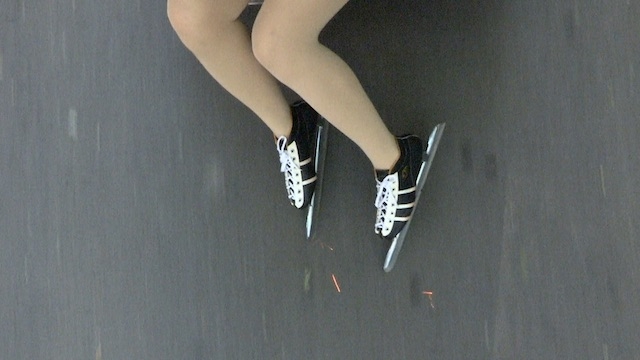In the darkened, single-room space of Ma Qiusha’s solo exhibition at MIMA, the soundtrack is grating, akin to fingernails clawing a blackboard. It emanates from the freestanding projection of All My Sharpness Comes from Your Hardness (2011), a video in which a pair of legs, bare except for black ice-skates, are shot from above as they struggle to skate along a tarmac road. At first this seems a riff on Alice falling down the rabbit hole; the legs appear to dangle as the road scrolls dizzyingly underneath them. Closer inspection of her shadow – and a read of the exhibition handout – reveals the full picture: Ma allowed herself to be strapped to the back of a car, and filmed ‘skating’ the distance between her childhood home and her grandmother’s house. Sparks fly, and the impact with the hard tarmac on which she sometimes appears to glide, without ever really finding her footing, speaks to the difficult hodology that individuals must find – or be dragged along – from childhood to adulthood.
Ma Qiusha’s work is represented here by video and photography, incorporating sculptural elements such as photos mounted in archival foam boxes. The artist was born in Beijing during the early 1980s and her work speaks to the changes in China’s political and cultural climates in the decades following her birth: opening up to foreign investment; the influx of Western consumer culture and neoliberal attitudes. Like most Chinese citizens born between 1979 and 2015 under the one-child policy, Ma has no siblings. And, like many girls born in this period, the artist tells us – in a confessional but emotive video, From No. 4 Pingyuanli to No. 4 Tianqiaobeili (2007) – her parents ‘wanted a boy’. The film is sparse, direct. Ma details her artistic journey from childhood, originating in highly pressurised drawing lessons enforced by her mother, who would watch through a window or sit beside her, pinching her leg sharply when a detail was rendered incorrectly. Ma is forgiving: she understands this punitive behaviour – her parents were poor, and wanted her to succeed – but at the end of the film her own discreet pain is revealed: she falls silent, and there are tears in her eyes as the camera zooms in and she removes a small razor blade from her tongue.
In light of this anecdote, the absence of drawing in the show becomes poignant. Relationships, when they are portrayed, appear as fraught conflict between conformity and individual freedom. Each of the three video channels of We (2009) depicts a couple dressed in white nondescript clothing and in different positions: standing side by side, standing embracing, sitting side by side. For a while, nothing happens. And then, slowly, one partner breaks away, tearing the fabric that had stitched each couple together. The remaining partner is left partially clothed, looking bereft and vulnerable; the sound of tearing echoes intermittently through the gallery.
The series 1990 (2017–18) explores such entanglements through the mass-produced household calendars popular during the 1990s, which often presented scenes of domestic femininity and other ‘wholesome’ images such as cats, flowers and smiling children. Ma disrupts these representations by rephotographing 12 images – one for each month – developing the prints as cyanotypes and displaying them in wall-mounted grey-foam frames. While the resulting blue of these warped images comprise an uneasy nod to the blue shirts of the Communist party uniform, the foam frames recall archival storage, alluding to the ways in which notions of femininity are circulated and monitored by normative cultural standards.
Ma’s work testifies to the turbulent, formative nature of upbringing, but it also affirms that context can be creatively harnessed. As All My Sharpness Comes from Your Hardness demonstrates: friction can sharpen your skates.
Ma Qiusha at MIMA, Middlesbrough, through 3 June
From the April 2018 issue of ArtReview
